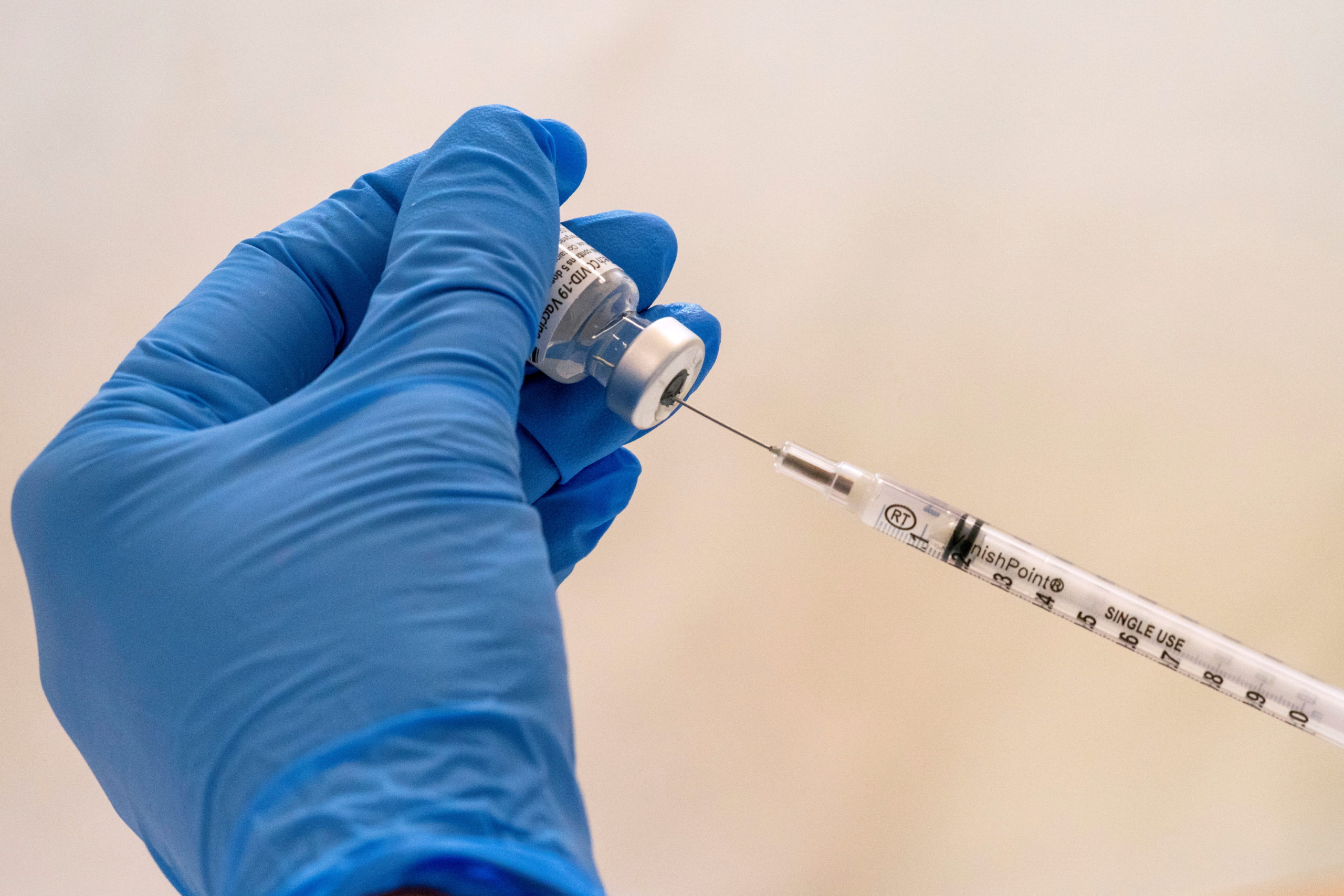
FILE PHOTO: A registered pharmacist fills a dead volume syringe with the COVID-19 vaccine on January 23, 2021. Mary Altaffer/Pool via REUTERS
MANILA, Philippines — With the latest $300-million loan approved by the World Bank, the Philippines these past two weeks secured a combined $800 million or about P40.2 billion in financing to buy booster and pediatric shots in 2022.
Together with the $1.2 billion in low-interest, concessional loans obtained from the World Bank, the Manila-based Asian Development Bank (ADB), and the Beijing-based Asian Infrastructure Investment Bank (AIIB) in March of this year so the government can purchase COVID-19 vaccines, the total multilateral financing for the nationwide, free mass vaccination program and its expansion to more age groups stood at $2 billion, or about P100.5 billion to date.
The World Bank’s Washington-based board on December 21 green-lit the Philippines COVID-19 emergency response project – additional financing 2, which it said in a statement Wednesday will cover about 27 million doses of COVID-19 vaccines.
On top of the boosters for adults, especially healthcare workers in the frontlines of the fight against COVID-19, senior citizens as well as persons with comorbidities, the newest World Bank loan will also be tapped to purchase jabs for kids under 17 years old, especially amid gradual reopening of in-person classes.
READ: World Bank okays another loan for PH worth $300 million for vax drive
Earlier World Bank estimates had shown that the lack of face-to-face classes in the Philippines amid the prolonged pandemic likely jacked up learning poverty to a new high of 90 percent this year.
Learning poverty – the share of 10-year-olds who cannot read nor understand a simple story – in the country was already 69.5 percent in 2019, pre-pandemic.
“Fair, broad, and fast access to effective and safe COVID-19 vaccines is vital to save lives and strengthen economic recovery. This funding operation is critical for the country to safely reopen the economy and resume economic and social development activities, including face-to-face learning, that were disrupted by the COVID-19 pandemic,” World Bank country director for Brunei, Malaysia, the Philippines, and Thailand Ndiamé Diop said.
The latest World Bank vaccine financing “will also help the country’s efforts to address emerging variants like Omicron,” Diop added.
In 2020, the World Bank’s initial financing for the COVID-19 emergency response project was $100 million. In March of this year, the World Bank extended to the Philippines an additional $500 million to buy vaccines under the same emergency response project currently being implemented by the Department of Health (DOH).
The $300-million second additional financing brought the World Bank’s cumulative loans for the DOH’s COVID-19 emergency response project to $900 million.
Last week, both the ADB and the AIIB also gave their go-ahead for $250-million each in loans for the second health system enhancement to address and limit COVID-19 under the Asia-Pacific vaccine access facility (APVAX) project or Heal 2 project – additional financing, also being implemented by the DOH.
Given the ADB and the AIIB’s combined $500-million contribution to the $549.37-million Heal 2 project, the government will have to shell out $49.37 million or nearly P2.5 billion from the proposed P5.02-trillion 2022 national budget.
Next year’s budget had set aside P45 billion in unprogrammed funds, which will be spent on additional vaccine doses.
Unprogrammed appropriations either came from foreign borrowings or excess revenues, the latter of which the government still does not have yet as revenue collections had been badly hit by the pandemic-induced economic slump.
This year’s vaccine purchases also funded the unprogrammed appropriations tucked in the P4.51-trillion 2021 budget.
Finance Secretary Carlos Dominguez III told reporters recently that the $800 million in fresh financing was “preparatory” in anticipation of additional vaccine doses needed to fight the nearly two-year-old COVID-19 pandemic.
Dominguez noted that vaccination for children under age 12 was yet to be approved by health authorities. “We don’t want to be pressed for time. We like to prepare, so it [the financing] is there,” he said.
Dominguez earlier said that the Department of Finance (DOF) deemed it proper to borrow vaccine funds from multilateral banks to prevent misuse and corruption. The lenders directly paid vaccine suppliers for the DOH’s orders – as such, no money passed through the government.
“We chose to finance our vaccine procurement from the multilateral agencies… because we wanted to assure the public that there is no overpricing. The World Bank, AIIB, and ADB will not finance anything that smells of overpricing. And believe me, they see the prices around the world; they know the prices to other countries, which we do not know,” Dominguez said earlier this month, referring to the nondisclosure agreements signed with global pharmaceutical giants.
“They definitely will not lend us any money if they suspect that there is any hint of corruption. So we designed this [financing] program that way to assure the public, and especially the legislature, that when we cannot disclose the prices because of nondisclosure agreements, we have a seal of good housekeeping from these agencies,” Dominguez had said.

